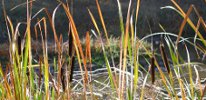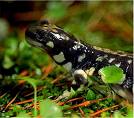
Training
California Tiger Salamander Workshop - special emphasis on sampling/surveying upland habitats

COST: $285.00
Payable by check to Elkhorn Slough Foundation
REGISTRATION FOR THIS PROGRAM IS CLOSED
Instructor Information
Dr. Peter Trenham
Independent Consultant
Contact
Grey Hayes
grey@elkhornslough.org
(831) 274-8700
Sponsors
Description
See also: California Tiger Salamander, Habitat Restoration
On June 21-23, 2010, Pete Trenham, Ph.D. presents a workshop in northern Monterey County on the biology and conservation of the California tiger salamander (CTS). Dr. Trenham has published a variety of papers on the ecology and life history of the California tiger salamander and has most successfully taught similar, popular workshops several times. This workshop differs from other, previously offered workshops in that this one focuses on the upland habitat of this threatened salamander, and especially the methods for sampling/surveying upland habitats.
Workshop venue is Hastings Natural History Reservation, approximately 1 hour east of Monterey. For accommodation information and more on the venue, see the end of this message. Hastings is a good site as there is a known breeding pond immediately adjacent to the property, thus providing participants with a probability of capturing metamorphosing juveniles as they emerge from the pond.
The workshop consists of both classroom and field sessions.
Day 1: June 21, 1:00 – 6:30 p.m. Classroom lectures and field sessions
Classroom session: introduction to basic CTS biology, especially focusing on upland habitat use, ecology, and sampling. Field session: Introduction to field materials and tools. Drift fence and pitfall trap construction.
Day 2: June 22, 6:30 a.m. – 11:00 pm Classroom lectures and field sessions
6:30 – 8:30, Morning field session, checking traps, weigh, measure, photograph animals and release.
8:30 – 10:00, Morning break.
10:00 – 3:00, Classroom lecture and group exercises (including lunch break)
3:00 – 6:00 pm, Aquatic sampling.
9:30 – 11:00 pm **Conditions dependent** night time fluorescent powder tracking of metamorph CTS.
Day 3 (optional): 6:30 – 11:00 Field Session
Checking traps, weigh, measure, photograph animals and release. Disassembling traps and correctly site restoration.
Workshop Objectives: This is a great opportunity to gain an understanding of the biology of California tiger salamanders. By completing this workshop, we hope you will also better understand how this information can be applied to habitat management for this species. The information conveyed will be useful in large-scale and local conservation planning efforts. Topics discussed will include: the geographic distribution of California tiger salamanders and hybrid populations, upland and aquatic habitats and their management, individual organism movement patterns, population and community ecology, survey methods, and methods for assessing potential project impacts and approaches for avoidance and minimization.
During a field training sessions, participants will also receive training in species identification, sampling techniques, and habitat requirements of the California tiger salamander. Workshop moderator Grey Hayes will use the field setting to assist participants in analysis of the impacts of a fictitious development proposal so that they will better be able to analyze impacts and design avoidance/mitigation in the real world.
Important Registration Details: Please note, you can pre-register using this website, but we must receive your payment no later than 5 p.m. May 31st for us to reserve a spot for you at the workshop. Your registration will not be completed without payment by this date. Send a check for $285 made out to the Elkhorn Slough Foundation, sent to Grey Hayes, c/o ESF, 1700 Elkhorn Road, Watsonville, CA 95076. We will email you after we have received your payment. We cannot refund any of your registration fee(s) if you cancel after 5 p.m. May 31st. Cancellation before this date results in our refunding all but a $50 processing fee. Registration is non-transferable; we do not allow people to 'trade' their registration, even with people in the same organization. We reserve the right to cancel the workshop by 5 p.m. June 7, in which case a full refund of fees would be remitted.
Accommodations: The workshop is being held at the Hastings Natural History Reservation, approximately 1 hour east of Monterey. For driving instructions and a map, see:
http://www.hastingsreserve.org/Contacts/DrivingInstructions.html
Camping is available at the venue. Showers and cooking facilities are available for campers. Otherwise, look for lodging via your usual tools in the area. Let us know if you need more help.
Documents and Publications
Contact List
We encourage participants to download the contact list to assist with arranging a rideshare or to get in contact with someone you met at the
workshop. Those interested in sharing a ride to the event are marked on the contact list.
| DOCUMENT | AUTHOR / SOURCE |
|---|---|
| WORKSHOP MATERIALS | |
| Presentation: California Tiger Salamander Upland Habitat Focus PDF, 1.7MB |
Dr. Peter Trenham Elkhorn Slough Coastal Training Program June 2010 |
| PEER-REVIEWED PUBLICATIONS | |
| Amphibian Upland Habitat Use & Its Consequences for Population Viability PDF, 197KB |
Peter C. Trenham & H. Bradley Shaffer Ecological Applications 15(4):1158-1168 2005 |
| Can California Ranchers Save The Tiger Salamander? PDF, 134KB |
Erik Stokstad Science 305:1554 September 10, 2004 |
| Distribution of Migrating Adults Related to the Location of Remnant Grassland around an Urban California Tiger Salamander (Ambystoma californiense) Breeding Pool PDF, 341KB |
Peter C. Trenham and David G. Cook Urban Herpetology, Herpetological Conservation, Mitchell, J.C., and R.E. Jung Brown (Eds.). Society for the Study of Amphibians and Reptiles, Salt Lake City, Utah, USA. 2008 |
| Hybridization Between a Rare, Native Tiger Salamander (Ambystoma californiense) and its Introduced Congener PDF, 310KB |
Seth P. D. Riley, H. Bradley Shaffer, S. Randal Voss, & Benjamin M. Fitzpatrick Ecological Applications 13(5):1263-1275 2003 |
| Spatially Autocorrelated Demography and Interpond Dispersal In The Salamander Ambystoma californiense PDF, 339KB |
Peter C. Trenham, Walter D. Koenig and H. Bradley Shaffer Ecology, 82(12):3519-3530 2001 |
| Terrestrial habitat use by adult California tiger salamanders PDF, 666KB |
Peter C. Trenham Journal of Herpetology, 35(2):343-346 2001 |
| The Effects of Livestock on California Ground Squirrels (Spermophilus beecheyii) PDF, 209KB |
Jeffrey S. Fehmi, Sabrina E. Russo, James W. Bartolome Rangeland Ecology and Management 58:352-359 July 2005 |
| The molecular phylogenetics of endangerment: cryptic variation and historical phylogeography of the California tiger salamander PDF, 280KB |
H. BRADLEY SHAFFER; GREGORY B. PAULY; JEFFREY C. OLIVER, and; PETER C. TRENHAM http://www2.eve.ucdavis.edu/shafferlab/publications.htm 2004 |
| The polytypic species revisited: genetic differentiation and molecular phylogenetics of the tiger salamander Ambystoma tigrinum (Amphibia: Caudata) complex PDF, 2.8MB |
H. Bradley Shaffer; Mark L. McKnight Evolution, 50(1):417-433 Feb. 1996 |
| OTHER INFORMATION | |
| Ambystoma californiense Gray, 1853, California tiger salamander PDF, 32KB |
Shaffer, H. B., and P. C. Trenham M. Lannoo, editor. Amphibian Declines - The Conservation Status of United States Species. University of California Press, Berkeley 2005 |
Questions and Answers
Submit a question on this subject and we'll provide an answer. coastaltraining@elkhornsloughctp.org
